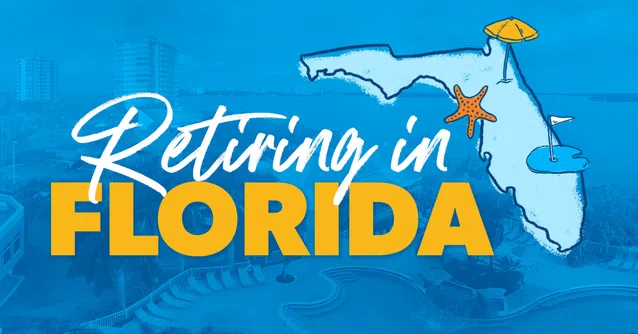Great article on making communities in Florida more livable for retirees. Love that they are making this a priority!
– Stacy Kitchell, Broker of Kitchell Group
What’s Next for Florida Real Estate?
2024 RE Trends panel: Helping new retirees and relocating workers find affordable housing while feeling a sense of belonging and community is vital to Fla.’s future.
ORLANDO, Fla. – Florida continues to attract retirees, businesses and workers relocating for new opportunities, but creating a sense of belonging and community– along with affordable housing – will be key to a thriving future, according to a panel of experts during Florida Realtors® 2024 Real Estate Trends summit last week.
“Real estate professionals can help build that culture of becoming part of a community and becoming a Floridian, when someone comes here, whether it’s for retirement or for a new job or business,” said Jeff Johnson, AARP Florida state director and one of the panelists. “People need to become invested in being part of our state and feel a sense of belonging, of community and having a strong social and support network that truly makes Florida ‘home’ for them. That’s a big job, and you (Realtors) probably didn’t sign up for it, but I’m giving it to you anyway.”
The summit was part of Florida Realtors® Mid-Winter Business Meetings at the Hyatt Regency Orlando, and included a discussion about “Florida’s Population Growth, Migration and Affordability.” The panel focused on how high housing costs are impacting retirees, workers and businesses in the state. Along with Johnson, panelists included Heather Kasten, president and CEO of the Greater Sarasota Chamber of Commerce and the moderator, Jennifer Warner, Florida Realtors economist and director of economic development.
Heather Kasten, president and CEO of the Greater Sarasota Chamber of Commerce
“From an employer’s perspective, running a business is hard – it’s been especially challenging the last few years with the pandemic, inflation, rising childcare costs and higher costs for everything.
“Affordable housing – the lack of it – is another rung of challenges for employers. In our area, we have employers telling us they have offered a high-paying position to someone, but that person didn’t take the job because they couldn’t find housing at a price they could afford to make the numbers work.”
She noted that ; and of those people, a study of W-2 forms indicates that their net income is $4.8 million. Wealthy retirees and those looking for a second home –and often pay cash – are competing for housing with a workforce of young professionals – moving here or already in Florida – who have to get a mortgage, Kasten said. The result? Those young professionals are getting shut out, or are forced to find a home that’s farther away from their work.
A recent survey of young professionals by the Greater Sarasota Chamber found that about 40% commuted to their workplace from up to 40 miles per day.
“I think we’re on the cusp of big changes when it comes to transportation and affordable housing,” Kasten said. “We’re exploring ways to incentivize including housing as part of business and workforce plans, as well as providing bonuses for added densities (for housing development).
“I think companies have to get creative in offering or providing housing for their employees. We’re already seeing that in some areas, where school systems and hospitals are providing places to live for teachers and nurses. The business community has got to show up at policy meetings and zoning meetings to demonstrate their support for Accessory Dwelling Units (ADUs) and changes in zoning density for more affordable housing.”
Jeff Johnson, state director of AARP Florida“People move to Florida with their heart; they leave Florida because of their head. Florida is extremely attractive to retirees and people are drawn to live here for many reasons. The dream is to come here, but then people get here and find the realities mean they leave – and the challenges are not solely financial, though that plays a part, from housing costs to property insurance.”
He added that retirees are looking for livable communities, places where it’s easy to get around, to walk to the grocery store or maybe a doctor’s office, to socialize and participate in activities and events they want to do. They look to see if people are around who can help them if needed, whether it’s family, new friends or some other support network – and over time, as retirees get older or need more assistance, they often move back to their original communities to be with family or friends, or where they feel more supported.
“The data shows that most people outlive their ability to drive by about 10 years,” Johnson said. “It would be great to increase the densities of established communities so that perhaps more ADUs could be part of them and provide a place for a caregiver to live if needed.
“And, while 55+ communities remain a very popular option, more and more retirees, in their 60s to 70s to even 80s, are living in downtown urban cores – where they can walk to places, go to restaurants, find entertainment and other activities.”
He added that having a sense of belonging and a sense of being connected to where they live and to the people around them is key for retirees and others relocating to Florida to feel at home.
“If you (as Realtors) are able to help the people who move here become connected to their communities and feel like they’re a part of it,” Johnson said. “Then you give people a reason to stay.”
Courtesy of © 2024 Florida Realtors®
Are you or any of your family/friends thinking of selling or buying? We can help! A little about us:
-
-
- Stacy Kitchell, Broker – Recovering Real Estate Financial Analyst, BS in Finance – Indiana Univ. Kelley School of Business. Stacy’s LinkedIn Profile
- About our Team – https://www.kitchellgroup.com/our-agents/
- #1 Realtor Team on Angi.com and consecutive winner of the Angi Super Service Award since 2012! Check out our reviews!
- Get to know us on YouTube! – For informative videos about all things real estate and more, visit our YouTube channel and subscribe to stay up to date on the market, homeowner tips, etc.
-
#1 Realtor team on Angi.com for years!




